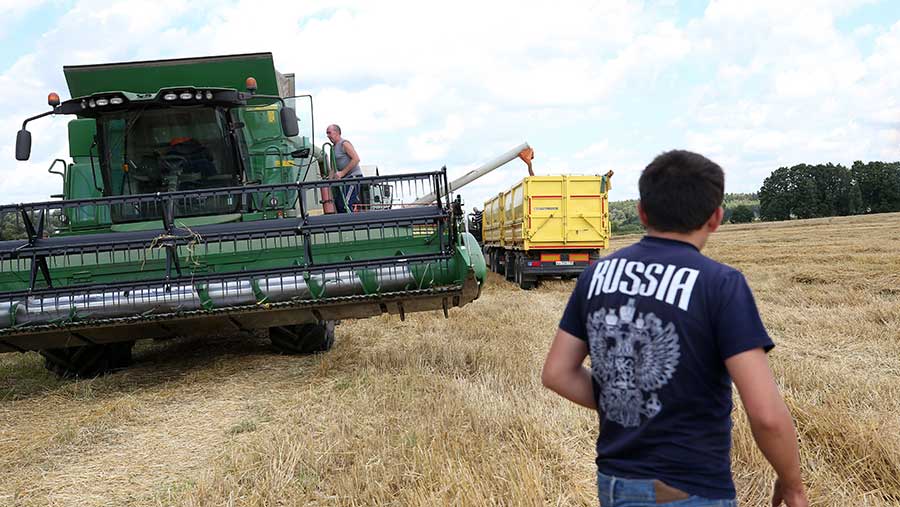Russian Dominance of Global Wheat Exports
"You can see the staggering increase in both production and exports from Russia.""Russia has invested heavily in order to increase market share and it's still growing."James Bolesworth, director, CRM AgricCommodities, U.K."It makes sense for import nations to open up access to a larger number of suppliers.""This will likely give them access to grain at cheaper levels in future."Andrew Whitelaw, co-manager, Australian consultant Thomas Elder Markets
 |
| Maxim Shipenkov/EPA/REX/Shutterstock |
Moscow concentrated on its revenues from oil and gas, delivering natural gas to the European Union through a pipeline that ran through Ukraine, using its energy resources as a diplomatic tool at times as much as a major export to beef up its GDP. For Estonia, Poland, Slovakia and Finland, more than 75% of their imports of petroleum oils came courtesy of the Russian energy giant. Until an energy glut and falling world oil prices put a crimp on that source of income. Then Russia and Germany reached an agreement on a new pipeline bypassing Ukraine.
 |
Wheat unloaded in Krasnodar, Russia.Photographer: Andrey Rudakov/Bloomberg |
With the largest geographic territory in the world, Russia has more than its share of natural resources; its price for natural gas and oil exports reduced, it has other resources -- its farmers and the rich agronomic tradition that its soil and hard labour have brought to bear in massive production of wheat fields. The failure of collective farming under the Soviet Union's vision of motivating workers through the Marxist ideal of working for a common purpose, which resulted in failed crops and disinterested farming enterprises now see incentivized farm labour where workers profit from their hard work.
An economy that once was reliant on wheat imports to feed its population has now been transformed into a giant wheat-exporting production sending its product all over the globe. Russia has become the dominant force of the wheat world in a matter of two decades of transformation. Russian farmers are proud of the magnitude of their successes in farming in general, and wheat production in particular. Over one hundred nations worldwide now rely on Russian grain imports, from Egypt to the Philippines.
Where once Russian grain was excluded from national markets because its grain quality was considered too low, contaminated by insects, countries have begun to lower their trade standard barriers. Algeria is a major buyer of wheat, and a week ago agreed to increase its shipments of Russian wheat, following Saudi Arabia's similar move, where state grains agencies agreed to accept wheat imports from countries including Russia in its next tender. Only small amounts of Russian wheat were accepted to the present reflecting Russian wheat's large levels of cargo bug damage.
 |
Nord Stream 2 facility, Mukran on Ruegen Islandon, Sassnitz, Germany. Carsten Koall | Getty Images |
It is no small thing to provide a large market like the EU with up to 40 percent of its oil and gas energy needs. And to capture a large share of the global market in wheat exports is a powerful indication of a nation whose economy will continue to grow; the world still requires large amounts of energy for production and heating and transport, and the world will never outgrow its fundamental need for human sustenance.
Russia increased its wheat exports to Saudi Arabia when that country too relaxed its wheat-quality standards. And it exports to Turkey, Brazil, Vietnam, Tanzania and more, with the expectation of shipping out 37.6 million tons this 2020 season, claiming its ranking as the world's top exporter of wheat. It has taken export-market share from the U.S. to the EU, dominating in sales to Egypt with its 82 percent of tender purchases, accounting for all cargoes bought in Egypt's latest tender.
France is losing out to Russia in Algerian wheat sales, once their largest customer. Canada and Australia, however, are stepping up their export presence, with both countries seeing increasing harvests and recent bumper crops. Russian farmers now make use of their rising incomes investing in fertilizers and the latest technological equipment to boost their output and expand storage for greater control in storing grain, awaiting better prices. Russia's low supply-chain costs also helped it take business from other suppliers.

Labels: Agriculture, Russia, Wheat Export

<< Home